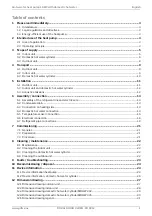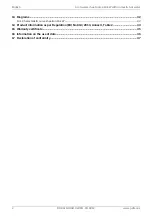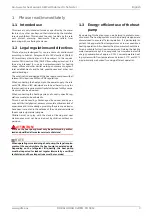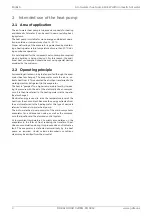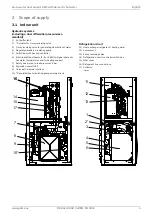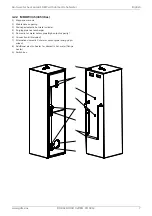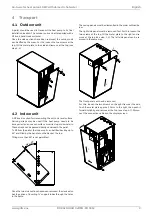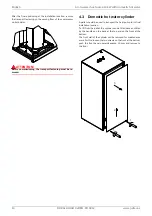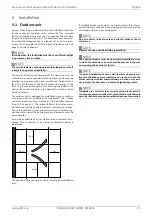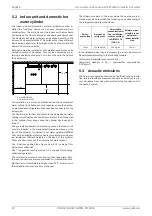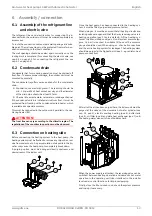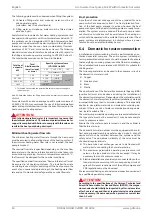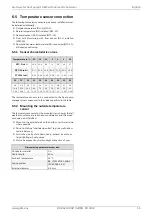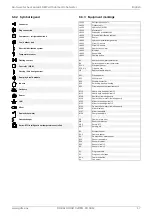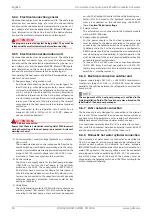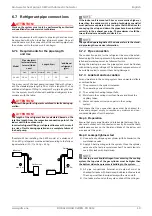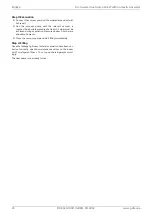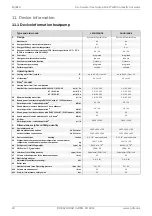
14
DOK4x HOIAO CxDEN · FD 9912
www.gdts.one
English
Air-to-water heat pump 16 kW with domestic hot water
The following points must be observed when filling the system:
Untreated filling water and make-up water must be of
drinking water quality
(colourless, clear, free of sediments)
Filling water and make-up water must be filtered (max.
pore size 5 µm).
Scale formation in domestic hot water heating systems cannot
be avoided, but in systems with flow temperatures below 60 °C,
the problem can be disregarded. With high-temperature heat
pumps and in particular with bivalent systems in the higher per-
formance range (heat pump + boiler combination), flow tem-
peratures of 60 °C and more can be achieved. The following
standard values should therefore be adhered to with regard to
the filling and make-up water according to VDI 2035, sheet 1:
The total hardness values can be found in the table.
Abb. 6.1:Guideline values for filling and make-up water in accordance with
VDI 2035
For systems with an above-average specific system volume of
50 l/kW, VDI 2035 recommends the use of fully demineralised
water and a pH stabiliser to minimise the risk of corrosion in the
heat pump and heating system.
!!
ATTENTION!
With fully demineralised water, it is important to ensure that
the minimum pH value of 7.5 (minimum permissible value for
copper) is complied with. Failure to comply with this value can
result in the heat pump being destroyed.
Minimum heating water flow rate
The minimum heating water flow rate through the heat pump
must be assured in all operating states of the heating system. If
the minimum heating water flow rate is not reached, the heat
pump is blocked.
The nominal flow rate is specified depending on the max. flow
temperature in the device information and must be taken into
account during planning. For return temperatures under 30 °C,
the flow must be designed for the nominal conditions.
The specified nominal flow rate (see “Device information”) must
be assured in all operating statuses. The installed flow rate
monitoring is used only for switching off the heat pump in the
event of an unusual and abrupt drop in the heating water flow
rate and not to monitor and safeguard the nominal flow rate.
Frost protection
A method of manual drainage should be provided for heat
pumps which are exposed to frost. The frost protection func-
tion of the heat pump manager is active whenever the heat
pump manager and the heat circulating pump are ready for op-
eration. The system must be drained if the heat pump is taken
out of service or in the event of a power failure. The heating cir-
cuit should be operated with a suitable frost protection if heat
pump systems are implemented in buildings where a power
failure can not be detected (holiday home).
6.4 Domestic hot water connection
Installation and commissioning must be performed by an au-
thorised specialist company. The entire system, including all
factory-assembled components, should be inspected to ensure
that everything is working properly and that there is no leakage.
The enamelled tank in accordance with DIN 4753 is suitable for
drinking water.
The following materials can be used in the consumer circuit in
the domestic hot water circuit:
Copper
Stainless steel
Brass
Plastic
The specifications of the Federal Environmental Agency (UBA)
(positive list) must also be observed during the installation of
the domestic water system. Depending on the materials used in
the domestic hot water system (customer installation), material
incompatibility may lead to corrosion damage. This especially
applies to zinc-plated materials and materials containing alu-
minium. If there is a risk of water contamination during opera-
tion, install a suitable filter.
The maximum permissible operating overpressure indicated on
the type plate must not be exceeded. It may be necessary to
mount a pressure reducer.
Ensure that the water supply is turned on and the cylinder is
filled before start-up.
The domestic hot water cylinder must be equipped with a certi-
fied, spring-loaded membrane safety valve on-site. A shut-off
device must not be installed between the cylinder and the
safety valve. The operational reliability of the valve must be
checked at regular intervals.
The bare-tube heat exchanger needs to be flushed with
water prior to connecting the hot water pipeline.
The maximum permissible operating overpressure indi-
cated on the type plate must not be exceeded. It may be
necessary to mount a pressure reducer.
Electrical installations should only be connected by author-
ised electricians according to the corresponding circuit di-
agram. All relevant requirements of the utility company and
VDE regulations must be observed.
We recommend having an annual service inspection carried out
by a qualified specialist company.
!!
ATTENTION!
According to the specifications of the German Technical and
Scientific Association for Gas and Water (DVGW), the magne-
sium anode should initially be inspected by after-sales service
after 2 years of use and then at regular intervals and replaced
when necessary. (Renew anode when protective current less
than 0.3 mA)
Total heat
output in
kW
Total
Alkaline earths
in mol/m³ and/
or mmol
Specific system volume
(VDI 2035) in l/kW
< 20
20 < 50
50
Total hardness in °dH
< 50
2.0
16.8
11.2
< 0.11
50 - 200
2.0
11.2
8.4
200 - 600
1.5
8.4
< 0.11
> 600
< 0.02
< 0.11
1
1. This value lies outside the permissible value for heat exchangers
in heat pumps.
Summary of Contents for 16CHOIAOC6
Page 2: ......


